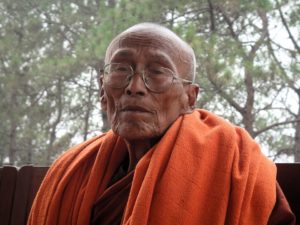Case:
A monk decided to test the wily old teacher, Roshi Joshu, by tugging sharply at his beard with the question, “Does a dog have Buddha-nature, yes or no?”
Giving this monk the fish-eye, Joshu Roshi answered, “Mu!”
Pointer:
 This monk is either a fool or a courageous seeker of truth; only one or the other would dare tug Joshu Roshi’s whiskers with so obvious an inquiry. Truly, for one such as Joshu, this is an insult. How can he take it?
This monk is either a fool or a courageous seeker of truth; only one or the other would dare tug Joshu Roshi’s whiskers with so obvious an inquiry. Truly, for one such as Joshu, this is an insult. How can he take it?
Roshi gives this monk the fish-eye, wondering if he is worth the effort to explain the fundamental truth. In the end, Roshi Joshu shows his infinite compassion to this fool and with one blow, a single sound tosses his opponent into the tiger’s pit.
With Joshu Roshi standing outside the pit, and the monk trapped below, Roshi throws down a ladder, a map, and a compass, “Mu!”
Discussion:
Joshu Roshi wears his heart on his sleeve. This case, first revealed in the year 1228 in a koan collection known as the Mummonkan or Gateless Gate shows us clearly why Joshu is one of our most beloved Roshis.
Words can be used to talk about our perception of Tao, the way and virtue of the universe’s fundamental truth. However, to show this truth directly, no words can suffice. This is why so many cases end with a paradox of words that can only point towards direct truth-realization or an existential experience so direct as to threaten the questioner’s life. To experience the way and its virtue one must be fully awakened from a mundane sleep.
The word “mu” is neither yes or no – it is a shoulder shrug to say that the question is not possible. Asking if a dog has Buddha-nature is like asking “What is the sound of one hand clapping.”
A dog does not have Buddha-nature because every element in the universe co-originates with every other element. A dog is the result of the entire universe, an aspect of that universe. Dog and universe cannot be separated because a dog, alone, cannot exist. The dog is a universal result and a cause in The Great Chain of the way and its virtue; one hand never clapped. This is what we mean when we say in Zen Buddhism that the universe is essentially empty, yet it gives rise to everything; it is empty of thingness, selfness, but overflowing with relationship and dynamism.
If a dog does not have Buddha-nature, but being an aspect of the whole universe, the way and its virtue, it does not lack Buddha-nature, all one can do is shrug a shoulder in reply.
If we say the dog does not exist, we are deaf and blind. If we say a dog does exist we deny its virtue to co-originate; it cannot be only a dog. Another name for The Great Chain of Being and the way and its virtue is Buddha-nature.
Resolution:
Roshi Joshu leaned over the pit of hungry tigers and shouted at the monk below, “Does a dog have Buddha-nature? Speak!”
The monk spoke immediately. “These tigers are not just tigers, but the way being what it is, they will eat me, Master.”





